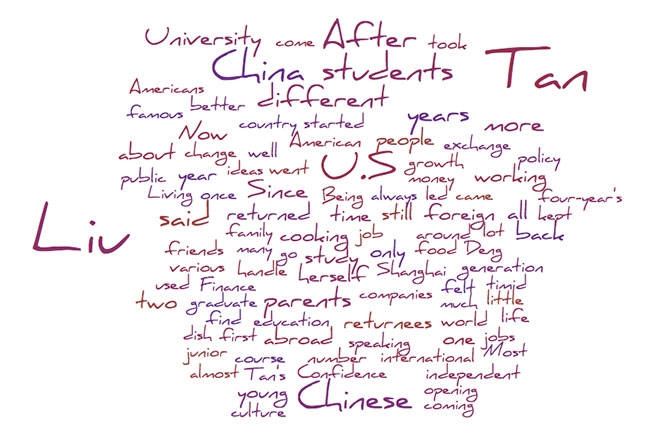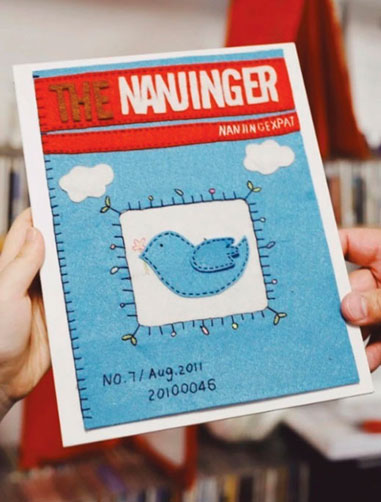When Liu Qiao got off the plane that landed at Guangzhou Baiyun Airport after 28 hours’ flying, it was sprinkling. Liu took a deep breath, and then realized a faint smell of moist mud and grass. This is the exclusive smell of the warm and rainy South of China. Tears were starting to appear in Liu’s eyes.
As Liu recalled this scene to me two years later, she was still emotional. In 2012, when Liu Qiao was still a junior of Sun Yat-Sen University, she joined in an international exchange program with Arizona State University. After one year of study in the United States, she came back with a straight-A transcript, countless precious memories, and, she said, a different personality. “Confidence and independence are two best things I learned from Americans,” Liu said.
Liu is one of the numerous returned students. In recent years, a growing number of study-abroad students choose to return to China for work. They once tried to fuse into foreign societies with their Chinese heritage, but now, they are coming back with marks of overseas cultures. Intentionally or not, returnees become cultural spreaders who enable domestic people to come into contact with foreign ideas.
With more and more foreign ideas flowing in, Modern China is experiencing a social change of living and thinking. The young generation is the main promoter and adopter.
At the first few weeks after Liu arriving in the U.S., she was on the verge of mental break down. Liu remembered, at that time, she could not understand lectures or handle homework because of her poor language. Also, she felt that she was totally a stranger there, as she dressed, ate, and talked in a different way. “I felt highly self-conscious…for a long time, I kept thinking ‘would they think I am ridiculous?’”
Things started to change as Liu registered a course called “public speaking”, which is a required course for undergraduates. Good speaking skills of American students shocked Liu, and prompted her to rethink about her timid character. Since then, she forced herself to take part in various activities, such as hiking, Christian fellowship, and parties. As people showed friendliness to this Chinese girl, Liu gained confidence little by little. Liu reminded, when the public speaking course was approaching the end, the instructor used the word “talkative” to describe her, which made her happy for several days.
Now Liu is working in a famous public relations corporation, which is located in Shanghai, responsible for planning events for foreign enterprises. Living in Shanghai all by herself with working under pressure, Liu does not feel troubled. “Returnees always know how to handle loneliness and pressure,” Liu dimpled.
Although in a different way of studying abroad with Liu, Tan Qiang mentioned the change from timid to confident as well. Tan, 24, is also a returned student. From 2010 to 2014, Tan Qiyang spent 4 years in the U.S., which left him a lifelong influence.
In 2008, Tan passed the Gaokao with a successful performance, which helps him to be admitted to Southwestern University of Finance and Economics. However, after two years of study, Tan wanted to try something different. He took a try in the test of selecting students to join in a “2+2 project”, which entitles participants to get 2 bachelor degrees from different universities by studying 2 years in China and 2 years in the U.S., and he got picked. After spending his junior and senior year in the University of Delaware, he went to Case Western Reserve University, which is situated in the state of Ohio, for his graduate study, still in finance major.
During this four-year’s life in the U.S., Tan took up two hobbies: working out and cooking. As doing physical training is a lifestyle of many Americans, Tan accepted it soon after he arrived in the U.S. But the reason for cooking is different. “I may integrate into every part of American culture, except food,” Tan said. Hating cheese and greasy food, Tan almost could find nothing to eat in the school dining hall. After eating instant noodles for a whole week, Tan finally made up his mind to learn to cook, which used to be a “girl’s thing” in his opinion. The first dish that Tan cooked was a common but traditional Chinese dish, scrambled eggs with tomatoes. He was cooking it in a flurry with his mom guiding him over the Facetime. Now, Tan was able to prepare a full table of delicious dishes to welcome his friends. He still keeps the habit of cooking on his own after returning to China. “It’s an attitude of an independent life,” Tan said.
For young people of the post-90s generation, such as Liu and Tan, who were born with the policy of reform and opening, the outside world is always accessible. In 1990s, Chinese government has released the policy of reform and opening. Deng Xiaoping, the leader of China at that time, encouraged Chinese students to go abroad and receive an overseas education. “Even though only one tenth of them returned,” Deng once said. Since then, China has broadened channels of communication with other countries, which led to the spring up of various overseas-education service agencies, and international exchange programs provided by almost all of the universities in China. As a result, more and more Chinese are enabled to see the outside world.
Today, much better than Deng’s expectation, around two thirds of students decide to return. According to Chinese Ministry of Education, since the year 2000, the growth rate of students returning has accelerated in a tendency of straight climb. In 2000, only 9,121 students decided to go back to China, as about 40,000 students went abroad; but in 2013, around 353,500 students returned, comparing with about 413,900 students went abroad that year.
After graduating from Sun Yat-Sen University, Liu did not continue her study in the U.S., which was unexpected for many of her friends and instructors. Nevertheless, this decision is quite reasonable for herself. “Since I have already known how the U.S. is, I can tell which country is more suitable for me.”
Though the U.S. is the most advanced country in the world, but Liu could not find at ease there. “In the U.S., I felt that I’m different all the time…and this feeling kept reminding me that here is not my home,” Liu said.
Tan’s reason for coming back is more practical. “I have a better career development in China,” Tan said. Now, Tan is working for an investment institution as an assets manager in Shanghai. When Tan was about to graduate, he once tried to find jobs in the U.S., but dismissed this idea disappointedly. “I would not be hired by famous companies without a green card, and I do not want to work for a small company with a low salary,” Tan said. Some companies offered Tan 50,000 dollars annual pay, which is nearly equal to Tan’s current earning now. “If the money is the same, why don’t I come back?”
Tan’s thought is universal among returnees. As the economy of China has developed rapidly, increasing job openings and chances are emerging in the job market. In 2008, when the U.S. was undergoing a financial crisis, the number of returnees reached its peak as 57.5%.
When asked the total expense of the four-year’s study, Tan showed an uncomfortable smile. “Around 1.2 million yuan. I owe my parents too much.” Different with the culture of individualism of the U.S., Chinese share a culture of collectivism. Most Chinese parents are used to saving money to pay for their children’s various bills, including education, houses, cars, wedding ceremony, and etc. However, Tan does not think it is appropriate. “Several of my American friends told me that they started to do part-time jobs to subsist themselves since they reached 18 years old…But I relied on my parents for life that time, it was a shame,” Tan said.
Liu expressed the similar viewpoint that Chinese young should be more independent, whether economically or mentally. Being the only child of her family, Liu has been well protected by her families in her growth. Her parents has driven her to and from school for 15 years, from she was a little kid to an adult. This overprotection phenomenon of parents happens a lot in China as well, since the one-child policy, which has released in 1980s, limits the number of kids of a family to only one.
Until Liu came to the U.S., she started to live on her own. Without parents’ handle all for her, she met a lot of difficulties. “People like to say that the post-90s generation is greenhouse flowers, timid, fragile, could not bear burden.” Liu thought this statement tells the truth. As Liu has changed herself, she wished other Chinese young could be braver enough to turn down their parents’ overprotection. “After all, being independent feels better,” Liu smiled.











